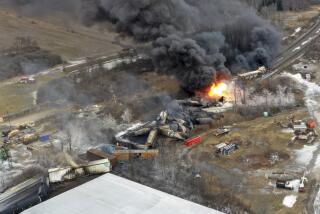China Project Derailed by Old Wounds
- Share via
BEIJING — It is a big vision on the drawing boards, a gleaming high-speed rail link between Beijing and Shanghai that could cut today’s tortuous 13-hour trip to as little as 3 1/2 hours.
But as China considers a Japanese consortium’s bid for the $12-billion train of the future, tensions from the two nations’ wartime past have intervened, apparently stalling the bidding process and providing a stark illustration of how that lingering history can play a powerful role even as Asia’s two biggest economies have become increasingly entwined.
Chinese officials gave strong indications this year that the famed Japanese “bullet train” technology would almost surely be used for the project, beating out other options that included German and French proposals.
But then signs of a surprisingly strong negative reaction emerged, including anti-Japan articles in some newspapers and a protest led by a nationalist group known as the Chinese Patriot Coalition, which garnered nearly 83,000 electronic signatures denouncing the use of any Japanese technology for the high-speed train.
The objections grew more bitter after metal scavengers at a dump in the northeastern Chinese city of Qiqihar last month unknowingly tore open buried containers of mustard gas that had been left by Japanese troops at the end of World War II. More than 40 people became seriously ill from the noxious substance, and one man died.
Despite Japanese apologies, medical help and discussions on compensation, the incident clearly aggravated the residual anger in China over Japan’s brutal wartime occupation of the country. Indeed, in another Internet-based campaign, this one coordinated on seven Chinese Web sites, organizers say they gathered more than 1 million electronic signatures demanding Japanese compensation.
The chemical injuries seem to have aggravated old wounds to such a degree that they are having an impact, at least for the moment, on plans for the train of the future. As state officials and academics here describe it, it was no coincidence recently when China indicated it was likely to delay an announcement on the bid, and in fact was considering a plan to divide the project into components, raising the possibility that several countries might receive contracts.
For good measure, China’s official New China News Agency reported that China might design and build the line itself, perhaps only “supplementing” the work with help from abroad.
The wording was ambiguous, and many experts here say China could eventually embrace the Japanese bid, perhaps after anger over the mustard gas casualties has abated. But for the moment, that anger has been acute enough to derail the bidding process, said Shi Yinhong, director of the Center for International Studies at People’s University in Beijing.
“This is an economic issue that has been politicized,” Shi said, “and not by the Chinese or Japanese governments, but by public opinion. China simply cannot make a very objective and rational calculation about the project right now.”
Peter Hays Gries, a China expert at the University of Colorado at Boulder, said the fracas over the train is a vivid demonstration that “popular opinion and especially popular nationalism can be genuine constraints on policymakers in China.”
Despite conceptions in the West that China’s Communist Party leaders have a free hand to impose their decisions, the situation is more complicated, said Gries, author of a forthcoming book, “China’s New Nationalism: Pride, Politics and Diplomacy.”
“The timing of the mustard gas incident is probably very much on the minds of decision makers,” Gries said. “It amounts to a very emotional issue, and they certainly do not want to hear charges that they are selling out the Chinese people. That is something that could be very dangerous to the party. And in that sense, they are very sensitive to domestic opinion.”
The Chinese Patriot Coalition, which offers some of the most inflammatory anti-Japan statements, is run by a nationalist group whose Web site manager, Feng Jinhua, was jailed in Japan for a few months in 2001 for painting critical graffiti at a Japanese war memorial.
In a telephone interview, Feng said the train contract was “not a pure economic issue,” because Japan still represented a potential strategic and even military threat to China.
“We are not against Japanese technologies,” he said, “but we are against the idea that Japan might be able to control China via its technologies.”
Among Chinese in general, there is tremendous respect for Japan’s technology and economic advances, and many Chinese note an indisputable truth: that the two countries need each other. Japan has doubled its investments in China in the last five years or so, and by several measures the two countries amount to each other’s most important trading partner these days.
At the same time, the bitterness over their wartime history has hardly dissipated, and “many Chinese still feel bullied when they think about Japan,” said Guo Dingping, a Japan scholar and professor of international relations at Fudan University in Shanghai. Incidents such as the mustard gas leak -- there are believed to be tens of thousands of other such drums still underground in China -- serve to inflame China’s anger and create difficulties in the nations’ diplomatic relationship.
Chinese Vice Foreign Minister Wang Yi said recently that the leftover weapons “make the Chinese people furious.” And Wu Bangguo, chairman of China’s National People’s Congress, or legislature, clearly was walking a difficult diplomatic line when he arrived in Tokyo recently for a weeklong visit.
On one hand, Wu noted that the two countries were celebrating the 25th anniversary of the Sino-Japanese Treaty of Peace and Friendship, which officially normalized relations, and said that a harmonious relationship between the two was a major key to peace and progress across Asia.
But Wu also raised the gas weapons issue with Japanese legislators, including Prime Minister Junichiro Koizumi. Meanwhile, plans for a summit between Koizumi and Chinese President Hu Jintao have yet to jell, in part because of Chinese objections to visits by the prime minister and other top political leaders to a war shrine for Japanese soldiers.
There are other tensions between the two nations. Many Japanese government and business leaders, like their counterparts in the United States, contend that China keeps its currency pegged to an artificially low exchange rate and drains jobs from elsewhere.
China is concerned that Japan may beef up its military forces, and it has reacted with alarm to some Japanese citizens’ suggestion that the country break a long-standing taboo and develop nuclear weapons.
In a flare-up of another source of periodic conflict, members of a Japanese nationalist group late last month staged a landing in a group of remote islands in the East China Sea to which China, Taiwan and Japan all lay claim.
Chinese media roundly condemned the visit to the site and said it violated China’s “territorial integrity and sovereignty.”
Into this volatile mix comes the train project, a potential source of immense national prestige and one that officials had hoped would be ready for the 2008 Summer Olympics in Beijing. In an apparent indication that the bidding process is up in the air, recent state media reports have suggested that the line might not be ready by then.
Sa Shuli, a Chinese rail technology expert at Northern Jiaotong University and a consultant on the train project, acknowledged in a telephone interview that the anger over the chemical weapons had played a role in the delay of the bidding process. It happened after the Economic Observer, a state-run Chinese weekly publication, had reported in July that China was “more than 90% certain” to use Japan’s bullet-train technology to build the line.
“The Chinese people’s protests did influence government’s decisions, and we even canceled a meeting with a visiting Japanese official,” said Sa, referring to a trip last month by Chikage Ogi, Japan’s minister of land, infrastructure and transportation, who wound up unable to see some top railway officials.
Sa was also one of the officials involved in the project who announced that China might build the line itself with only supplemental help from other countries. In the end, defining what is “Chinese” about the train link and what is “foreign” could amount to semantics, but if the Chinese generally consider the project home-grown, it would be a much greater source of pride.
Among other things, the line is to run through Nanjing, which especially suffered under Japan’s occupation.
The officials in charge have made no final decision on the project, and various state reports have indicated that safety and “use of first-class technologies” remain the biggest priorities, which could be indications that the Japanese bid will yet be accepted. The technology has a nearly spotless safety record.
Japanese officials have taken a fairly low-key approach to the delay, perhaps hoping the mustard gas controversy will wane.
However, some have appealed to the Beijing-Tokyo cooperation that a Japanese- designed line could signify.
“We must run bullet trains across the bridge which we established with the Japan-China Peace and Friendship Treaty,” Japan’s chief Cabinet secretary, Yasuo Fukuda, said recently in an official visit to Beijing.
Zhang Xiuying of The Times’ Shanghai Bureau contributed to this report.
More to Read
Sign up for Essential California
The most important California stories and recommendations in your inbox every morning.
You may occasionally receive promotional content from the Los Angeles Times.












